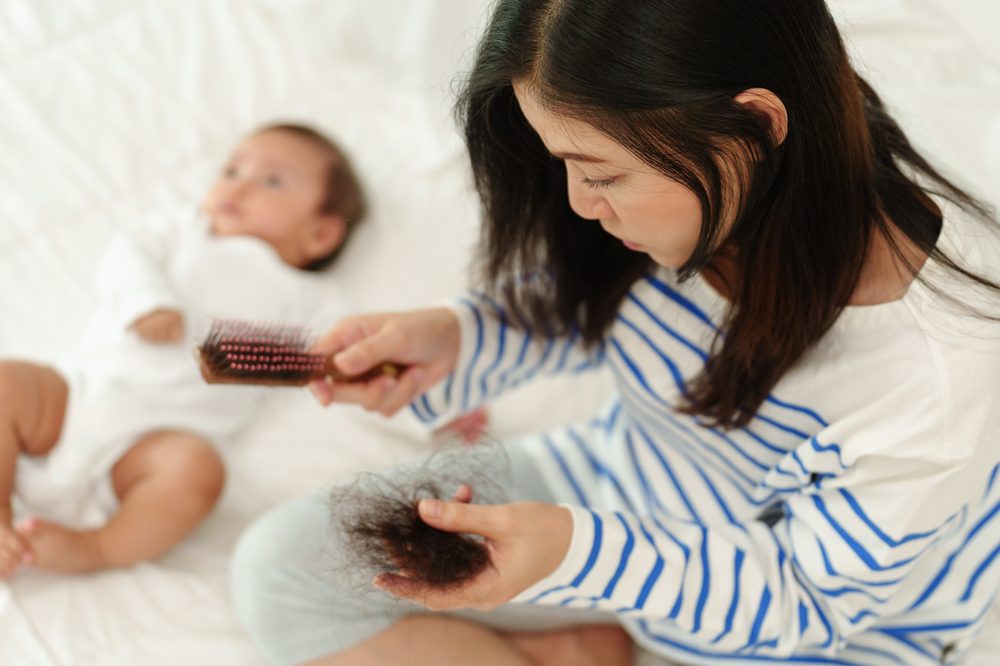Introduction:
Bringing a new life into the world is a remarkable journey filled with joy and wonder. However, amidst the joys of motherhood, many women experience a less talked about phenomenon – postpartum hair loss. This natural occurrence can be distressing for new mothers, but understanding its causes, implementing preventive measures, and exploring treatment options can help alleviate concerns and restore confidence. In this comprehensive guide, we’ll delve into the intricacies of postpartum hair loss, offering valuable insights and practical solutions for coping with this temporary phase.
Understanding Postpartum Hair Loss:
Postpartum hair loss, also known as postpartum alopecia, is a common condition experienced by many women in the months following childbirth. Typically occurring around three to six months postpartum, it is characterized by excessive shedding of hair, resulting in thinning or noticeable hair loss. While alarming, postpartum hair loss is a temporary condition and usually resolves on its own within a few months.

Causes of Postpartum Hair Loss:
Postpartum hair loss is primarily attributed to hormonal fluctuations that occur during pregnancy and childbirth. During pregnancy, elevated levels of estrogen prolong the growth phase of hair, resulting in thicker, fuller hair. However, after childbirth, estrogen levels plummet, causing hair follicles to enter the resting phase prematurely. As a result, a larger-than-normal amount of hair sheds, leading to noticeable hair loss.
In addition to hormonal changes, other factors that contribute to postpartum hair loss include:
1. Stress: The physical and emotional stress of childbirth and caring for a newborn can exacerbate hair loss.
2. Nutritional Deficiencies: Inadequate intake of essential nutrients, such as iron, vitamins, and protein, can impact hair health and contribute to shedding.
3. Sleep Deprivation: Disrupted sleep patterns common in the postpartum period can disrupt the body’s natural processes, including hair growth.
4. Genetics: A family history of hair loss or thinning can predispose women to postpartum hair loss.
Preventive Measures for Postpartum Hair Loss:
While postpartum hair loss is largely inevitable due to hormonal changes, there are steps that women can take to minimize its severity and promote hair health:
1. Maintain a Balanced Diet: Consuming a nutrient-rich diet high in vitamins, minerals, and protein can support overall hair health and minimize shedding.
2. Stay Hydrated: Adequate hydration is essential for maintaining healthy hair follicles and promoting optimal growth.
3. Manage Stress: Incorporating stress-reduction techniques such as mindfulness, meditation, and relaxation exercises can help mitigate the effects of stress on hair.
4. Gentle Hair Care: Avoiding harsh styling techniques, excessive heat, and chemical treatments can prevent further damage to fragile postpartum hair.
5. Supportive Supplements: Consult with a healthcare provider about the potential benefits of supplements such as biotin, iron, and omega-3 fatty acids for promoting hair growth.
Treatment Options for Postpartum Hair Loss:
While postpartum hair loss typically resolves on its own over time, some women may seek additional interventions to address persistent shedding or accelerate regrowth. Treatment options for postpartum hair loss include:
1. Topical Treatments: Over-the-counter or prescription topical treatments containing minoxidil or other hair growth stimulants may help promote regrowth and reduce shedding.
2. Scalp Massage: Regular scalp massage can improve circulation to the hair follicles, potentially enhancing hair growth and thickness.
3. Platelet-Rich Plasma (PRP) Therapy: PRP therapy involves injecting the patient’s own platelet-rich plasma into the scalp to stimulate hair growth and improve hair density.
4. Laser Therapy: Low-level laser therapy (LLLT) devices emit red light wavelengths that penetrate the scalp and stimulate hair follicles, promoting regrowth.
Conclusion:
Postpartum hair loss is a common and temporary condition experienced by many new mothers. While it can be distressing, understanding its causes, implementing preventive measures, and exploring treatment options can help alleviate concerns and promote hair health. By nourishing the body with a balanced diet, managing stress, and adopting gentle hair care practices, women can support their hair’s natural growth cycle and minimize the effects of postpartum shedding. Additionally, consulting with a healthcare provider can provide personalized recommendations and interventions to address persistent hair loss. Remember, postpartum hair loss is a temporary phase, and with patience and self-care, full and healthy hair can be restored in due time.


